|
_Do you want to take your golf game to the next level in the coming year? If you don't then you'd better check that you have a heart beat...Seriously though, I'm sure you do, but do you know what to do, or even have the tools to get you there! 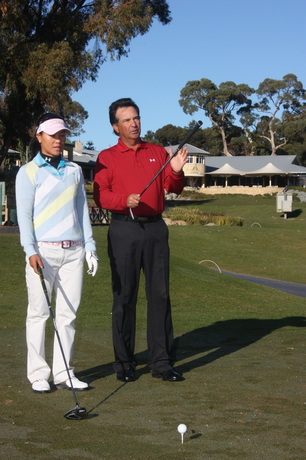 Most passionate golfers set lofty goals for themselves and like most New Year's resolutions by the second week in January many have given up on them and gone back to their old ways of practicing and limiting themself. So how do you stay motivated to move towards consistent golf improvement? The first thing to do is to "Know" where you are with your overall game, and not where you "Think" you are! What do I mean? Do you track basic statistics in your game like these?
If you're in that 95% who don't keep stats use January for gathering base line data in at least these statistical categories which will give you a more accurate picture of where you are. 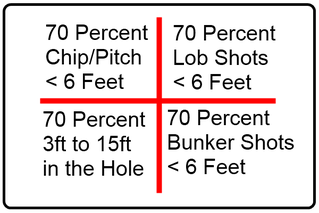 _ "Golfers who don't keep statistics of their golf games from my experience just can't face the truth of how bad parts of their game are, so they spend more time working on their strengths and ignore the weak areas." - David Milne (Director of Pro Tour Golf College) Now you know where your golf improvement journey starting point is so next step is to decide where your destination (Goal) is. It has to be defined clearly and succinctly, like my co director Lawrie Montague explains it; "if you get into an elevator on the ground floor with a total stranger you can externalise your golf goal to that person by the time you get to the 10th floor?" This takes practice, so it's your responsibility to visit your goals everyday not on just a cognitive (thinking) level but more importantly on an emotional and physical level until it's embedded into your subconcious. This helps to create a strong and dependable belief in what you're doing helping you to "stay the path" until you achieve your goal. No one can do it by themselves so select someone who can guide and mentor you, who has the knowledge and understanding of how to get to the pathway of golf improvement. As we continually state at Pro Tour golf College, the "Perfect Golf Swing" is not the answer; a holistic plan that measures your progress continally and moves you to lower scores is what you need. Jack Nicklaus the first golfer who understood this and built his whole playing schedule around the "4 Majors" each year. With his 18 Majors I would say he got it right! Ben Hogan did the same but it was more due to the injuries he received in a horrific car accident he and wife Valerie were involved in, and had to limit the amount of tournaments he could play in during the year. 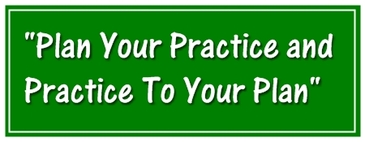 _By putting in place an annual periodisation plan will ensure that you do technique adjustment only at the appropriate time and not the week of major events on your calendar. You will always be ready to play golf at these tournaments and not be 'thinking swing.' So select periods in the year where these important tournaments are situated and ideally there shouldn't be more than six. Lastly be realistic with the time you designate for practice and play so you can maintain the momentum throughout the year. Make the time you practice more effective by keeping a detailed training log so you can be more specific on what you do at each session, and an assessment at the end to measure your progress. For those who are time poor, make the time to play a few holes early or late in the day which can make a real difference. Follow the plan, stick to it and you will take your game to the next level...and beyond. We wish all you passionate golfers a "Happy New Year" and everything you wish for in 2012. David Milne and Lawrie Montague 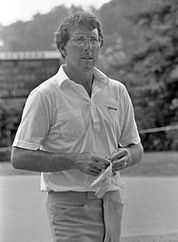 _Hale Irwin is playing great golf on the Champions Tour in his mid sixties and shows us all the importance of maintaining our health and fitness and a strong, competitive drive so we can continue to tap into our awesome potential. In 2011 he played in 21 tournaments and made the cut in every event. He had 7 top ten finishes and earnings of $624,811 Hale Irwin had 20 victories on the PGA Tour beginning with the 1971 Sea Pines Heritage Classic and finishing with the 1994 MCI Heritage Golf Classic, and won prize money of just under six million dollars. His 1994 Heritage win at the age of nearly 49 made him one of the oldest winners in Tour history. He also won two Piccadilly World Match Play Championships at Wentworth in the 1970s. His successes kept him ranked high among his peers - he was ranked among the top five in Official World Golf Rankings for a few weeks in 1991. _Irwin qualified to play on the over-50 Champions Tour (formerly the Senior PGA Tour) in 1995 and has enjoyed even greater success at this level than he did on the PGA Tour. 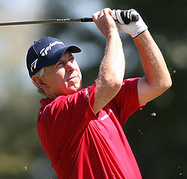 _He has won 45 Champions Tour titles and tops the all-time Champions Tour money list with earnings of over USD $23 million. He was the winner of the U.S. Senior Open in 1998 and 2000. Irwin was inducted into the World Golf Hall of Fame in 1992. Source: http://en.wikipedia.org/wiki/Hale_Irwin Dr. Bob Rotella is one of the worlds leading golf performance psychologists and mental skills coach to numerous PGA and LPGA golfers. We hope you enjoy this video and that you gain some valuable insights into being a better performer on the golf course.  _BOB ROTELLA'S RULES - 10 Things a Golfer ust do in every competitive round. 1. Play to play great. Don't play not to play poorly. 2. Love the challenge of the day, whatever it may be. 3. Get out of results and get into process. 4. Know that nothing will bother or upset you on the golf course, and you will be in a great state of mind for every shot. 5. Playing with a feeling that the outcome doesn't matter is always preferable to caring too much. 6. Believe fully in yourself so you can play freely. 7. See where you want the ball to go before every shot. 8. Be decisive, committed and clear. 9. Be your own best friend. 10. Love your wedge and your putter. Gary Player one of the greatest golfers of the 20th century has some facinating insights into the game. In this interview he talks about his views on Jack Nicklaus, Tiger Woods and the state of the game. This is a great interview of a true golfing legend and we hope that you enjoy it as much as we did. BREAKING NEWS....NEWS....NEWS....NEWS....NEWS....NEWS........ 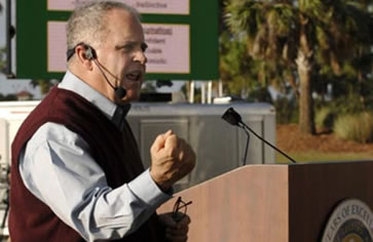 Bobby Forster Speaking at the 2006 USPGA Teaching and Coaching Summit At Pro Tour Golf College we are proud to announce that we are now using The Mental Golf Workshop Profile designed by Bobby Foster from 2012 with our students attending our college. This comprehensive and highly accurate profile provides you with a 20 plus page report that accurately assesses your golf personality style for learning and playing golf to the best of your ability. Your comprehensive report provides an accurate picture of your golfing personality and customized strategies for these areas of your game…
"The beauty of this system is that our players get an accurate and comprehensive report without having to spend hours completing a laborious questionnaire. You sure get a lot for the time and money you invest in this process." – Dr. Greg Rose, Co-Founder, Titleist Performance Institute The profile was developed by Bobby Foster, a management consultant headquartered in Columbia, SC. Bobby is a former teaching professional and golf coach at the University of South Carolina where he coached several All-Americans including four players who played on The PGA Tour. He is a Certified Behavioral Analyst specializing in the DISC Behavioral Style Model. He explains the purpose behind the development of the mental golf profile - The system generates personalized information for working on your mental game just as video and launch monitors produce personalized information for working on your swing and customizing your equipment. The profile works great for self-coaching as well as for collaborating with your instructor or coach. Following is the outline of the Mental Golf Workshop™ profile process
Your report is produced in a "workshop" format, with space provided to make notes as you work through your report. This format makes it easy to self-coach yourself or to review with your instructor or coach. We suggest reviewing all of the information and then selecting the key items that will most impact your performance. Perhaps the most effective method for reinforcing these key points is to write them on index cards and put them into a plastic bag you keep in your golf bag. Review these index cards before your practice sessions and rounds and you’ll be delighted with the positive impact this awareness and repetition will have on your performance. The cost of the report is US $65.00 and will be the best investment you can make in your game for 2012 and beyond. These are just some of the organisations using this profile...
http://www.mentalgolfworkshop.com (type in your access code procollege) Lawrie Montague and David Milne "Pro Tour Golf College the Prep College for Tour Golfers and Serious Amateurs Who Want to Be" _ Top Professional golfers who play golf on tour are unique individuals who passionately pursue their dream of achieving success on the PGA and LPGA tour’s with drive, energy and determination. They allow us to see what lies within; the potential to be a lot better than we currently are. 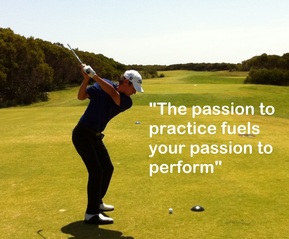 __ To improve your golf you need a strong passion to constantly fuel your motivation. Passion comes from your desire to be excellent at what you do, and golf is one game where you have to work very hard over a long period of time to gain a high measure of control over your golf shots and ultimately your golf scores. By removing the "quick fix" mentality from your thinking and working hard on your weakest, most important skills you can make progress with your golf. Your passion to improve will keep you focused on the task, and in the weeks and months from now you will reap the rewards of your dedication with better golf shots and lower golf scores. |
Archives
June 2019
|
Proudly Supported By
Copyright © 2011 - 2018 Pro Tour Golf College
Website Managed By Golf Performance Media
All Rights Reserved
Website Managed By Golf Performance Media
All Rights Reserved


 RSS Feed
RSS Feed



